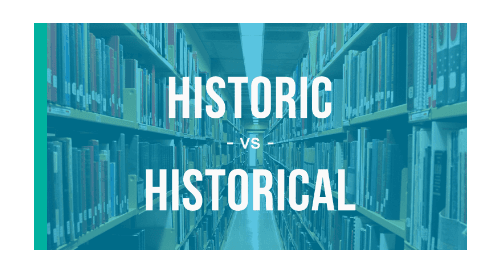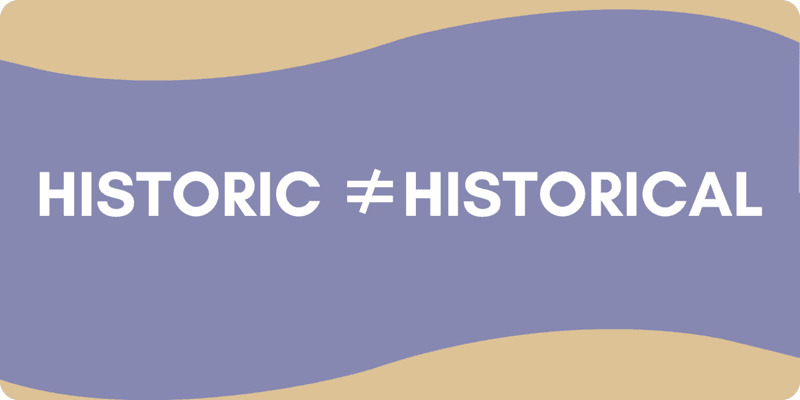Historical vs. Historic: Navigating the Differences and Definition

The English language is full of tricky vocabulary. Non-native English speakers often struggle with words that sound or look alike but mean different things. 'Historical' and 'historic' are a classic example of this. They might seem like they can be used interchangeably. But, if you dig a bit deeper, you'll see that's not true.
In this blog post, we're going to discuss these similar-sounding words in detail. We will provide detailed explanations, examples and practical tips for correct usage. Follow this guide and you'll never mix up 'historical vs historic' again.
What is the Difference Between 'Historical' and 'Historic'?
The words 'historical' and 'historic' are adjectives that have their roots in history. But they serve different functions. Let's begin by looking at historical vs historic definition.
'Historical' primarily refers to any aspect or element from the past. It simply indicates that something relates to history or occurred in the past. For instance, any old monument in your city would be referred to as a historical structure, whether it played any significant role or not.
'Historic' refers to something that has a significant impact on history. For example, we might say, "India's Independence Day is a historic event."
Now let's consider a couple of practical examples:
These family photos are historical records of your ancestors.
The signing of the Indian Constitution on 26th January 1950 was a historic moment.
You can check out the Cambridge Dictionary guide Historic or historical? for more examples.
Remember this simple rule. All historic events are historical, but all historical events are not historic! In your professional life, you may come across doubts about the definitions of historical vs historic. You may also be confused about the use of historical vs historic data. In such instances, remember that the difference lies in the level of significance!
Practical Tips for Mastering the Usage of 'Historical' and 'Historic'
Remembering the difference between 'historical' and 'historic' can be difficult, but with these simple tips, you can master it easily.
Visualisation techniques: Think of 'historic' as a spotlight. It shines on a key event or figure on a stage representing history. In contrast, 'historical' is like looking at the entire stage. This may be filled with many characters and events.
Mnemonic devices: Remember, 'historic' is like 'hitting' a final shot in cricket. It's a game-changer. But, 'historical' is like 'typical' – part of the general course of events.
Let’s apply this understanding in a conversation:
Anu: "I visited the historic Red Fort last weekend."
Manu: "That's amazing! It played such an important role during India's independence."
Anu: "I also went to an exhibition on historical artefacts from various dynasties."
Manu: "Sounds fascinating! History truly comes alive through such items."
Sharpen Your Skills: Exercises on 'Historic' and 'Historical'
The best way to master 'historical' vs 'historic' differences is through practice. Let's do some practice exercises.
Choose between 'historic' and 'historical' to fill in the blanks:
a) The Taj Mahal is a ________ monument.
b) He is an enthusiast of _____ data and loves studying old records.
c) This event has been considered a _____ milestone in Indian sports history.
d) The _____ buildings in Old Delhi hint at a rich past.
After you are done marking the answers on your own, you can check the answers and explanations here:
a) Historic: Given its global significance, the Taj Mahal is considered “historic”.
b) Historical: Data from the past is referred to as “historical” data.
c) Historic: The event signified a major milestone, hence it's 'historic.'
d) Historical: Here, we’re talking about the buildings' connection to the past. Hence, "historical" is suitable.
Remember to keep practising. You can make use of Clapingo's resources for an in-depth understanding of such differences in English. Here is a useful article: Top 25 English Speaking Course Books You Shouldn't Miss.
Broadening Your Vocabulary: Related Terms to ‘Historical’ and ‘Historic’

To master the English language, it is important to have good vocabulary skills. Here are some terms related to ‘historical’ and ‘historic’ to expand your vocabulary:
Antiquated: Very old or old-fashioned.
Example: "The antiquated law needs revision."
Ancestral: Relating to family ancestors.
Example: "The ancestral home still stands in Rajasthan."
Bygone: Referring to something that belonged to a past time.
Example: "The bygone era of royal Maharajas is often romanticised."
Heritage: Used to talk about the culture of a particular society. This includes traditions, languages, or buildings that were created in the past and still have importance.
Example: "Our heritage sites need preservation."
If you wish to improve your vocabulary further, you can check out this Clapingo blog: How to Improve Vocabulary in English Online at Home
Elevate Your English Learning Journey with Clapingo
Understanding complex English terms can be a challenge. This is especially true when they seem so similar, like 'historical' and 'historic'. This is an aspect that many language learners struggle in mastering.
This is where Clapingo can assist! Clapingo offers personalised one-on-one coaching sessions tailored for non-native English speakers in India. These sessions are designed to help you conquer and master language challenges. Clapingo offers a detailed exploration of vocabulary, fluency, pronunciation and sentence structure. The classes also address specific challenges faced by each learner.
Check out this YouTube video to learn more about Clapingo:
Mastering 'Historical' vs 'Historic': The Way Forward
By now, you must be confident in using the words 'historical' and 'historic' accurately. Remember, 'historic' refers to something significant. 'Historical' means related to the past or history. It's the basic differences like this that form the foundation of proficient English communication. Mastering them will help you in the long run.
Continue this exploration on reliable platforms like Clapingo. With practice, you'll grow comfortable with these terms. Eventually, you will be able to improve your overall communication skills.
FAQs
1. What is correct: a historical or an historical?
A: Use "a historical." The "h" at the beginning of "historical" is not silent. So, "a" is appropriate.
2. What is the difference between historic and old?
A: "Historic" implies significance or importance. "Old" simply refers to age.
3. How do you use historical in a sentence?
A: Historical is used as an adjective in a sentence. Here’s an example: “The monument has great historical value."
Comments
Your comment has been submitted